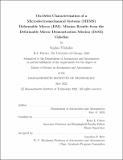On-Orbit Characterization of a Microelectromechanical Systems (MEMS) Deformable Mirror (DM): Mission Results from the Deformable Mirror Demonstration Mission (DeMi) CubeSat
Author(s)
Vlahakis, Sophia
DownloadThesis PDF (7.551Mb)
Advisor
Cahoy, Kerri L.
Terms of use
Metadata
Show full item recordAbstract
The Deformable Mirror Demonstration Mission (DeMi) CubeSat operated from July 2020 to March 2022 and demonstrated the successful operation of a Microelectromechanical Systems (MEMS) Deformable Mirror (DM) on orbit for the first time. As part of space-borne adaptive optics systems, DMs correct optical aberrations and speckles due to mechanical, thermal, and optical effects. MEMS DMs are particularly well suited for space systems because they are compact, low power devices and have a high density of actuators to provide high precision wavefront control. This makes MEMS DMs a key technology for future space-based telescopes with adaptive optics for applications such as exoplanet direct imaging with coronagraphs.
The DeMi payload design is a miniature space telescope with an adaptive optics system including a 140-actuator MEMS DM from the Boston Micromachines Corporation (BMC) and a Shack-Hartmann wavefront sensor (SHWFS). The mission objectives were on-orbit characterization of the MEMS DM, on-orbit demonstration of closed-loop mirror control, and improvement of the point spread function (PSF) of an astronomical source.
This thesis discusses experiments characterizing the on-board MEMS DM by using the SHWFS to measure deflections of individual actuators on the DM in response to input voltages up to 150 V. Results show the DeMi mission successfully measured on-orbit actuator deflection to a precision of 12 nm for input voltages up to approximately 100 V. Repeatability is characterized by the difference in measured deflection between actuators commanded to the same voltage over time, which is shown to have a median of between 2-13 nm in space. Data from space operations show that on-orbit DM performance and measurement uncertainty are similar to ground testing performance. Together, ground testing and on-orbit data indicate a correlation between actuator deflection amount and temperature, with actuators deflecting 22% less at when the payload temperature is at 6 degrees C than at 28-29 degrees C.
The DM performed consistently and accurately throughout its lifetime with no evidence of actuators becoming stuck or unresponsive. The DeMi mission results have raised the Technology Readiness Level (TRL) of MEMS DM technology from a 5 to a 9.
Date issued
2022-05Department
Massachusetts Institute of Technology. Department of Aeronautics and AstronauticsPublisher
Massachusetts Institute of Technology